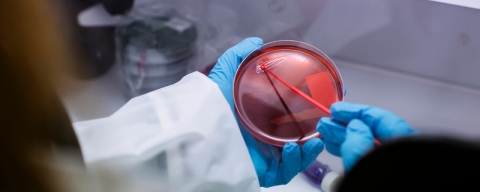
Key information
UCAS code:
B940
Accreditation:
This course is Accredited
Typical offer:
112-120 from 3 A levels, or equivalent, to include 80 points in specific subjects
Showing content for section Overview
Overview
Biomedical scientists help identify rare diseases, diagnose disease, research disease processes and monitor patients’ treatment. On this accredited BSc (Hons) Biomedical Science degree, you’ll develop the expertise you need to start making your own contribution to the medical advances of the future.
This course is accredited by the Institute of Biomedical Science (IBMS) – a mandatory requirement if you want to work in the NHS after graduation. It's also accredited by the Royal Society of Biology.
Course highlights
- Put your knowledge to the test in our labs and simulation facilities, which are kitted out with industry-leading microscopes, spectroscopy and chromatography equipment
- Get involved with internationally recognised biomedical research into fields like neuro-oncology (the study of brain and spinal cord cancers) at our Institute of Life Sciences and Healthcare
- Take an optional work placement year at an Institute of Biomedical Science (IBMS) approved clinical training laboratory, and you'll be eligible to apply for registration as a Biomedical Scientist with the Health and Care Professions Council (HCPC) when you graduate
- Have a chance to take an international placement within a recognised biomedical research organisation as part of the Turing Scheme
95%
of graduates in work or further study 15 months after this course
(HESA Graduate Outcomes Survey 2018/2019)

5th
for Anatomy and Physiology in the UK
(Guardian University Guide, 2024)
Accredited by:
This programme has been accredited by the Institute of Biomedical Science (IBMS) and the Royal Society of Biology, following an independent and rigorous assessment. Accredited degree programmes contain a solid academic foundation in biological knowledge and key skills, and prepare graduates to address the needs of employers. The accreditation criteria require evidence that graduates from accredited programmes meet defined sets of learning outcomes, including subject knowledge, technical ability and transferable skills.
Studying Biomedical Science at the University of Portsmouth
Students and staff at the School of Pharmacy and Biomedical Sciences talk about our Biomedical Science BSc (Hons) course at the University of Portsmouth.
Dr Gavin Knight: I think Biomedical Science is a really up and coming area and we are always at the forefront of Biomedical Science delivery and education.
We cover all the main pathological disciplines: haematology, microbiology, biochemistry, histology and blood transfusion So people get a really good overview of what Biomedical Science in a clinical practice is all about using a case study based approach, and all the background science that accompanies it to make that understandable as well.
As part of the Biomedical Science course and our 3 year or 4 year route we have opportunities for placement. We’ve got great partnerships with our NHS providers, they provide us with a lot of opportunities for students to go out and learn to be biomedical scientists as part of the course.
Donna: The facilities here at the University of Portsmouth are really cutting edge. We have a lot of technology and lots of hands on equipment that get you ready for when you go out into the working world.
To other students thinking of applying to this course I would say go for it! You get so much support from your lecturers and personal tutor and it’s pushed me out of my comfort zone but it’s made me grow quite a lot and challenge me to do things that I didn’t think I could do before.
Dr Gavin Knight: Portsmouth is absolutely the place to be to learn how to become a biomedical scientist.
Contact information
Contact AdmissionsEntry requirements
BSc (Hons) Biomedical Science entry requirements
Typical offers
- A levels - BBB-BBC
- UCAS points - 112-120 from 3 A levels, or equivalent, to include 40 points from Biology and 40 points from a second Science subject or Mathematics. For A levels which include a separate science practical component, a pass is desirable and may strengthen an application. (calculate your UCAS points)
- T-levels - Merit. Acceptable T Level Subjects:
T Level in Health, T Level in Healthcare Science, T Level in Science (Acceptable Occupational Specialisms: Laboratory sciences) - BTECs (Extended Diplomas) - DDM-DMM
- International Baccalaureate - 29
You may need to have studied specific subjects – find full entry requirements and other qualifications we accept.
English language requirements
- English language proficiency at a minimum of IELTS band 6.0 with no component score below 5.5.
See alternative English language qualifications.
We also accept other standard English tests and qualifications, as long as they meet the minimum requirements of your course.
If you don't meet the English language requirements yet, you can achieve the level you need by successfully completing a pre-sessional English programme before you start your course.
We look at more than just your grades
While we consider your grades when making an offer, we also carefully look at your circumstances and other factors to assess your potential. These include whether you live and work in the region and your personal and family circumstances which we assess using established data.
If you don't meet the entry requirements, you may be able to join this course after you successfully complete a foundation year.
Your facilities
Pharmacy and Biomedical Science Teaching Centre
Practise the skills needed to diagnose and help people manage diseases, including collaborative microscopy - examining 3D microscopic images on a big screen with academics and other students.
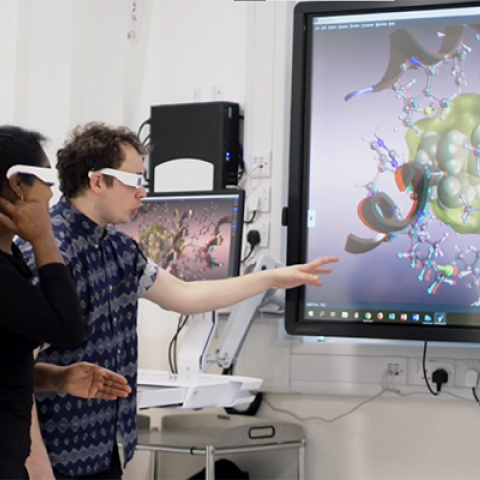
Pharmaceutics Laboratories
Develop a better understanding of the causes and consequences of diseases in these labs, as well as the skills and expertise needed to develop and test new drugs.
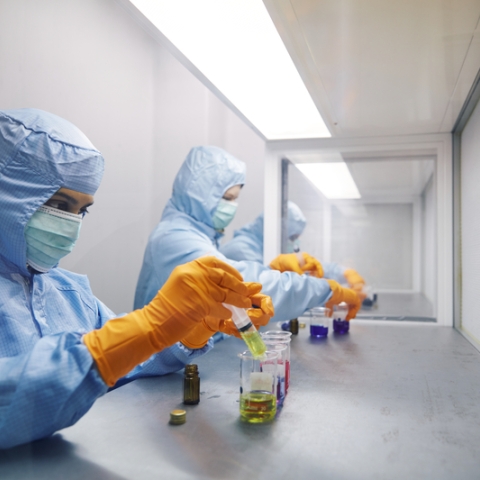
Institute of Life Sciences and Healthcare
We're exploring disciplinary boundaries to discover, understand and develop knowledge for the benefit of the environment and humankind.
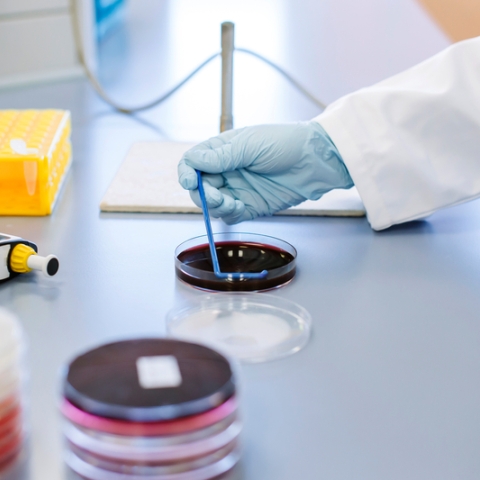
Biophysical laboratories
Use professional-standard equipment to explore how the structures and functions of molecules change under different conditions.
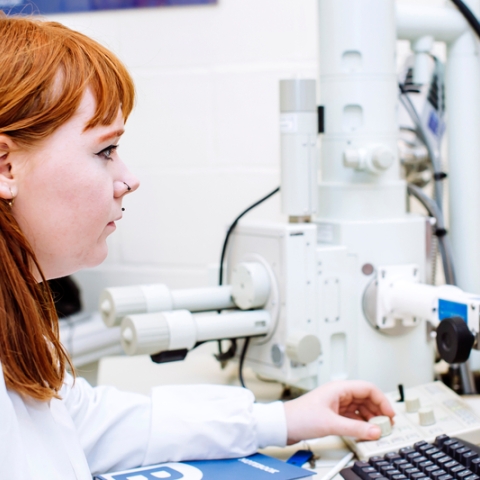
Careers and opportunities
Whether it's processing tests for diseases such as coronavirus or providing diagnosis services to GPs, accident and emergency departments and other health services, registered Biomedical Scientists play a key role in public health.
They analyse fluid and tissue samples from patients in order to identify diseases or evaluate the effectiveness of different treatments. In fact, more than 70% of NHS diagnoses are based on lab findings by biomedical scientists, so it's a profession that's always in high demand.
On this BSc (Hons) Biomedical Science degree, you’ll learn to diagnose, monitor and manage health conditions. You’ll learn from our outstanding team of biomedical scientists and researchers whose work is shaping the understanding of conditions, such as brain tumours.
HCPC registration
After you've graduated and completed 12 months of work-based learning within an Institute of Biomedical Science (IBMS) approved clinical training laboratory, you'll be eligible to apply for registration with the Health and Care Professions Council (HCPC) and work as a Biomedical Scientist in the NHS and private settings.
Royal Society of Biology membership
You can also apply for Associate Membership of the Royal Society of Biology, which gives you access to professional networks and exclusive grants and awards.
The lecturers support you and encourage you to get involved with the endless opportunities available, so you can make the most of your student experience, while also gaining key transferable skills.
What areas can you work in with a biomedical science degree?
You can use your biomedical science knowledge in related fields such as:
- scientific research
- teaching (with further training)
- scientific writing
- medical sales
- medicine and dentistry (with further training at medical or dental school)
- becoming a Physician Associate (with further training)
- postgraduate study or research
Graduate roles and destinations
Roles recent graduates have gone on to do include:
- biomedical scientist
- clinical trial coordinator
- medical lab assistant
- science teacher
- dental nurse
- medical affairs executive
They've gone on to work for companies such as:
- Pall Europe
- Pfizer
- Roche
- Viapath
- Imperial College London
- Bristol Royal Infirmary
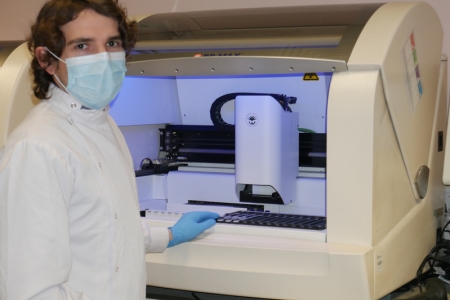
Read about Simon's post-grad career in the NHS"Choosing to study biomedical science at Portsmouth meant I was able to enter my current career directly from university."
Potential salary
As a biomedical scientist in the NHS in 2021, you could expect a starting salary of £25,655 moving up to £31,534 (Band 5).
With more experience, you could earn from £32,306 to £39,027 (Band 6) and with a role as a senior biomedical scientist, you could make between £40,057 (Band 7) and £53,219 (Band 8a), or more as a consultant biomedical scientist.
Placement year
After your second or third year, you can do an optional work placement year to get valuable longer-term work experience in the industry. Placements give you the opportunity to apply what you've learnt so far in a real workplace, boosting your employability and making you attractive to employers after graduation.
If you do your placement in an IBMS-approved NHS pathology laboratory, you can complete the IBMS registration portfolio. This means you'll be eligible to apply for registration with the HCPC as a Biomedical Scientist when you graduate.
Our students have completed clinical placements at the following hospitals:
- University Hospital Southampton
- Queen Alexandra Hospital, Portsmouth
- Royal Bournemouth Hospital
- Poole Hospital
- Salisbury District Hospital
Whichever route you choose, you'll receive support and guidance. Our specialist team of Science and Health Careers advisors can help you with finding a work placement and improving your employability skills. They'll provide you with a database of placement vacancies, support with your job search – including help with applications and interviews – and support throughout your placement year.
Summer research placement
You'll also have the opportunity to apply to a study exchange scheme, which involves a summer research placement through the Turing Scheme.
Ongoing careers support
After you graduate, you can get help, advice and support for up to 5 years from our Careers and Employability Service as you advance in your career.
Modules
Each module on this course is worth a certain number of credits.
In each year, you need to study modules worth a total of 120 credits. For example, four modules worth 20 credits and one module worth 40 credits.
What you'll study
Core modules
All modules in this year are core.
In addition, it provides a grounding in enzymes and enzyme kinetics, together with drug-receptor interactions, how the body handles drugs, and the processes surrounding drug discovery, clinical trials and medicines regulation.
Core modules
Further to this, it introduces a wide range of applications of these techniques to research and development. Laboratory and data analysis workshops are utilised to demonstrate theory into practice, and develop practical skills. These are delivered through a predominantly face to face approach, with some online (asynchronous and synchronous) activities.
Optional modules
You’ll rapidly build knowledge across disciplines like marketing, finance and project management. You'll become equipped to evaluate and pursue new commercial opportunities.
Working in teams, you’ll practice skills from communication to negotiation by developing plans for a prospective venture, receiving expert insights from practitioners along the way. With assessments focused on conceiving and presenting an impactful business case, you’ll strengthen abilities to persuade with data-backed reasoning.
Developmental Biology investigates the development of multicellular organisms throughout their lifespan, from the start of life and the emergence of the first organs to the changes in external appearance and organ function as well as organ repair and regeneration in the adult. Over the last nine decades, research in the field of developmental biology has led to major discoveries (and Nobel Prizes) and has spurred substantial medical progress (IVF, gene- and stem cell-based therapy, understanding of cancer). However, this progress has also sparked controversy (e.g. on therapeutic cloning, eugenics, xenotransplantation) and has shaken views on human identity and evolution.
You'll explore how, after fertilisation, functional organs and the adult body form emerges in the embryo, and you'll discuss how deviations from these developmental processes may result in major birth defects. You'll also investigate how cells and stem cells repair organs in the adult.
The content of the module will be delivered in lectures and workshops. In addition, you'll learn the basic practical skills of how to handle small samples under a microscope. The workshops support critical and independent thinking about the taught topics and re-emphasise the abstract concepts in developmental biology. In addition, the workshops and the second practical/demo in lecturers' research labs will discuss how scientific discoveries in developmental biology have been made and are being made today, and how we ensure that research aligns with the requirements of research ethics.
The modules does this by covering a number key aspects of the academic component of the IBMS Registration Portfolio. These include but are not restricted to: NHS structure, legislation covering working in a care laboratory setting e.g. audits, accreditation, Equality, Diversity and Inclusion, good laboratory practice, health and safety, licensing, safeguarding responsibilities for staff and patients.
Core modules
Optional modules
On this course you'll:
- Compare and contrast the major developmental mechanisms in embryos from a range of model organisms.
- Assess the relationship between developmental biology and evolution.
- Propose appropriate experimental systems to investigate specific problems in developmental biology.
- Analyse and interpret data relating to developmental biology
- Critically assess the main lines of reasoning in landmark papers in development biology.
- Identify and access relevant literature and information sources including online databases.
The modules does this by covering a number key aspects of the academic component of the IBMS Registration Portfolio. These include but are not restricted to: NHS structure, legislation covering working in a care laboratory setting e.g. audits, accreditation, Equality, Diversity and Inclusion, good laboratory practice, health and safety, licensing, safeguarding responsibilities for staff and patients. Within this module, you'll have the opportunity to learn with and from other healthcare professions through interprofessional educational activities.
Fast-track your personal and professional development with the opportunity study abroad in a higher education setting through a one year study placement or gain work experience in an NHS or industrial placement.
Depending what you choose, you'll develop intercultural awareness and other skills relevant to your future employability by undertaking additional learning in an international environment, or have the opportunity to or take on an optional year-long placement module where you'll work in a biomedical role and reflect on what you've done, the skills and abilities you've gained, and challenges you have met and overcome.
This is a Connected Degree
We're the only university that gives you the flexibility to choose when to take a work placement. Take it after your 2nd year, before returning to finish your studies. Or after your final year, connecting you into the workplace.
If you're not sure if or when to take your placement, don't worry. You'll have plenty of time to settle into your studies and explore your options before making your choice.
Changes to course content
We use the best and most current research and professional practice alongside feedback from our students to make sure course content is relevant to your future career or further studies.
Therefore, some course content may change over time to reflect changes in the discipline or industry. If a module doesn't run, we'll let you know as soon as possible and help you choose an alternative module.
How you're assessed
- essays
- laboratory reports
- workshops
- presentations
- group work
- practical assessment classes
You’ll be able to test your skills and knowledge informally before you do assessments that count towards your final mark.
You can get feedback on all practice and formal assessments so you can improve in the future.
Teaching
Teaching methods on this course include:
- lectures
- seminars
- practical lab work
- guided reading
- collaborative and peer-assisted learning
- simulation
Academic staff have expertise in clinical practice and research. Our HCPC registered Biomedical Scientists work closely with the Institute of Biomedical Science (IBMS) advisory panels to ensure what you learn reflects new development and technology in the field.
You can access all teaching resources on Moodle, our virtual learning environment, from anywhere with a Web connection.
For more about the teaching activities for specific modules, see the module list above.
How you'll spend your time
One of the main differences between school or college and university is how much control you have over your learning.
We use a blended learning approach to teaching, which means you’ll take part in both face-to-face and online activities during your studies. As well as attending your timetabled classes you'll study independently in your free time, supported by staff and our virtual learning environment, Moodle.
A typical week
We recommend you spend at least 35 hours a week studying for your degree. In your first year, you’ll be in timetabled teaching activities such as tutorials, lectures, seminars and practical classes and workshops for about 14 hours a week. The rest of the time you’ll do independent study such as research, reading, coursework and project work, alone or in a group with others from your course. You'll probably do more independent study and have less scheduled teaching in years 2 and 3, but this depends on which modules you choose.
Most timetabled teaching takes place during the day, Monday to Friday. You may occasionally need to go to University and course events in the evenings and at weekends.
Term dates
The academic year runs from September to June. There are breaks at Christmas and Easter.
Supporting you
The amount of timetabled teaching you'll get on your degree might be less than what you're used to at school or college, but you'll also get support via video, phone and face-to-face from teaching and support staff to enhance your learning experience and help you succeed. You can build your personalised network of support from the following people and services:
Types of support
Your personal tutor helps you make the transition to independent study and gives you academic and personal support throughout your time at university.
As well as regular scheduled meetings with your personal tutor, they're also available at set times during the week if you want to chat with them about anything that can't wait until your next meeting.
You'll have help from a team of faculty learning support tutors. They can help you improve and develop your academic skills and support you in any area of your study.
They can help with:
- improving your academic writing (for example, essays, reports, dissertations)
- understanding and using assignment feedback
- managing your time and workload
- revision and exam techniques
As well as support from faculty staff and your personal tutor, you can use the University's Academic Skills Unit (ASK).
ASK provides one-to-one support in areas such as:
- academic writing
- note taking
- time management
- critical thinking
- presentation skills
- referencing
- working in groups
- revision, memory and exam techniques
Our online Learning Well mini-course will help you plan for managing the challenges of learning and student life, so you can fulfil your potential and have a great student experience.
You can get personal, emotional and mental health support from our Student Wellbeing Service, in person and online. This includes 1–2–1 support as well as courses and workshops that help you better manage stress, anxiety or depression.
If you require extra support because of a disability or additional learning need our specialist team can help you.
They'll help you to
- discuss and agree on reasonable adjustments
- liaise with other University services and facilities, such as the library
- access specialist study skills and strategies tutors, and assistive technology tutors, on a 1-to-1 basis or in groups
- liaise with external services
Library staff are available in person or by email, phone, or online chat to help you make the most of the University’s library resources. You can also request one-to-one appointments and get support from a librarian who specialises in your subject area.
The library is open 24 hours a day, every day, in term time.
If English isn't your first language, you can do one of our English language courses to improve your written and spoken English language skills before starting your degree. Once you're here, you can take part in our free In-Sessional English (ISE) programme to improve your English further.
Course costs and funding
Tuition fees
- UK/Channel Islands and Isle of Man students – £9,250 per year (may be subject to annual increase)
- EU students – £9,250 (including Transition Scholarship – may be subject to annual increase)
- International (non-EU) students – £19,200 per year (subject to annual increase)
Funding your studies
Find out how to fund your studies, including the scholarships and bursaries you could get. You can also find more about tuition fees and living costs, including what your tuition fees cover.
Applying from outside the UK? Find out about funding options for international students.
Additional course costs
These course-related costs aren’t included in the tuition fees. So you’ll need to budget for them when you plan your spending.
Additional costs
Our accommodation section shows your accommodation options and highlights how much it costs to live in Portsmouth.
You’ll study up to 6 modules a year. You may have to read several recommended books or textbooks for each module.
You can borrow most of these from the Library. If you buy these, they may cost up to £60 each.
We recommend that you budget £75 a year for photocopying, memory sticks, DVDs and CDs, printing charges, binding and specialist printing.
If your final year includes a major project, there could be cost for transport or accommodation related to your research activities. The amount will depend on the project you choose.
You’ll get free safety equipment at the start of the course. However, you may have to pay a small amount to replace lost or damaged equipment.
If you take optional work-based learning units, you’ll need to pay for travel to and from placements, which normally costs around £50.
If you take a placement year or study abroad year, tuition fees for that year are as follows:
- UK/Channel Islands and Isle of Man students – £1,385 a year (may be subject to annual increase)
- EU students – £1,385 a year, including Transition Scholarship (may be subject to annual increase)
- International students – £2,875 a year (subject to annual increase)
Apply
How to apply
To start this course in 2024, apply through UCAS. You'll need:
- the UCAS course code – B940
- our institution code – P80
If you'd prefer to apply directly, use our online application form.
You can also sign up to an Open Day to:
- Tour our campus, facilities and halls of residence
- Speak with lecturers and chat with our students
- Get information about where to live, how to fund your studies and which clubs and societies to join
If you're new to the application process, read our guide on applying for an undergraduate course.
Applying from outside the UK
As an international student you'll apply using the same process as UK students, but you’ll need to consider a few extra things.
You can get an agent to help with your application. Check your country page for details of agents in your region.
Find out what additional information you need in our international students section.
If you don't meet the English language requirements for this course yet, you can achieve the level you need by successfully completing a pre-sessional English programme before you start your course.
Admissions terms and conditions
When you accept an offer to study at the University of Portsmouth, you also agree to abide by our Student Contract (which includes the University's relevant policies, rules and regulations). You should read and consider these before you apply.

